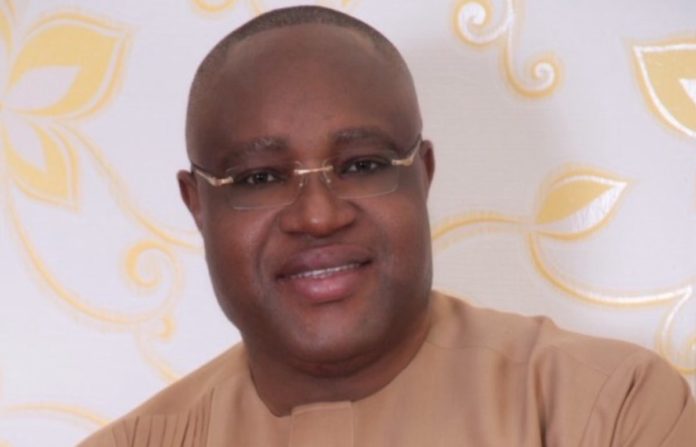.as FG targets 2,000 CNG filling stations in six months
As part of effort aimed at providing a cheaper and cleaner alternative for vehicle users as the country moves toward the full deregulation of the downstream petroleum sector,the Federal Government of Nigeria is targeting the establishment of 2,000 Compressed Natural Gas (CNG) filling stations in the next six months,
The Group Managing Director, Rainoil Ltd., Mr Gabriel Ogbechie stated this while speaking at the NEAC Webinar series, organised by the National Association of Energy Correspondents (NAEC).
on the theme ” Deregulation and Sustainable National Energy Future through Natural Gas.”
According to him Nigeria requires about $6bn worth of investment in alternative energy and global drive for energy transition. Marketers can leverage in this opportunity by investing in gas adoption and utilization such as LPG bulk storage, LPG trucks, LPG filling plants, LPG skids, Gas cylinder manufacturing, LNG plants, CNG/LNG Trucks, LNG Regassification / Compression stations and CNG Filling Stations.
An estimate of over N10 billion ($27 million) will be generated by switching 50% of kerosene and firewood users to LPG. So also proper channeling of flared gas could impact the country’s gross domestic product by up to $1 +billion per year. It has the potential to create over 1 million jobs, 600,000 metric tons of LPG per year and generate 2.5 gigawatts of power.
He also stated that it will also drive the Development of Emerging Economies through Technological Advancement.
The Rainoil boss listed other opportunities to include promoting Compressed Natural Gas, CNG, as an alternative cheaper fuel, deepening of Autogas as alternative to Petrol – CNG, providing kits for pilot conversion of 1 million cars, targeting of over 2,000 CNG filling stations within 6 months.
“Marketers will also be enjoy the N200 billion infrastructure fund earmarked by the Central Bank of Nigeria, CBN, to support Autogas facility roll-out by Marketers. The current reserve estimate of Natural gas is over 60 trillion cubic feet”, he said.
Ogbechie however, noted that about 63% of the Associated Gas produced during the production of crude oil is currently being flared.
“Section 52 of the Petroleum Industry Bill, PIB, proposes the establishment of a Midstream Gas Infrastructure Fund. A specialized intervention mechanism to deepen gas usage in the country, by making equity investments of government-owned participating or shareholder interests in infrastructure related to midstream gas operations… projects financed in part by private investment”, he added.
The FG’s sustainable national energy plan according to him seeks to deliver and maintain 5 million new off-grid solar connections under a “solar power strategy”. Around 77 million Nigerians are either underserved by, or completely lack access to, the national electricity grid. Transition from traditional fuels for cooking to cleaner Liquefied Petroleum Gas, LPG, fuel in its “National LPG Expansion Programme” Eliminating gas flaring using the Nigeria Gas Flare Commercialization Programme.
“With almost 8 billion cubic meters of gas flared annually, Nigeria is the seventh-largest gas flaring nation in the world”, he revealed.
Nigeria lost N300bn to gas flaring in 7 month of 2020. But the country has the objective of reaching zero flaring by 2030”, Stated Rainoil boss.
Speaking further on the prospects of the Downstream Sector after the Petroleum Industry Bill, PIB 2020 currently waiting for passage into law by the National Assembly, he said, the PIB proposes four distinct players in the sector: namely, (1) the Minister of Petroleum Resources: empowered to formulate, monitor and administer government policy in the petroleum industry.
Secondly, the Nigerian Upstream Regulatory Commission (The Commission): this will take over most of the upstream regulatory functions of the DPR. Responsibilities include: Administer and enforce policies and regulations on upstream petroleum operations. Administer and enforce compliance on the issuance of licenses and leases and publish upstream sector reports and statistics.
Thirdly, the Nigerian Midstream and Downstream Petroleum Regulatory Authority (The Authority): PEF and PPPRA will be merged into one regulator with technical and commercial regulatory responsibilities including: Administer and enforce policies, laws and regulations for midstream and downstream petroleum operations. Market monitoring and promotion of competition. Oversee tariffs for transportation by pipelines, bulk storage for petroleum products, and regulated open access facilities and govern the implementation of the Nigerian Gas Transportation Network Code
Fourthly, the Nigerian National Petroleum Company Limited: created as a successor company to the NNPC and is to be established within 6 months of the Bill passage.The Group Managing Director also stated that the PIB provides that the pricing of petroleum products in the downstream product sector: shall be deregulated to ensure market-based pricing, adequate supply and removal of economic distortions and creation of a fair market value for petroleum products in Nigeria’s economy.

























